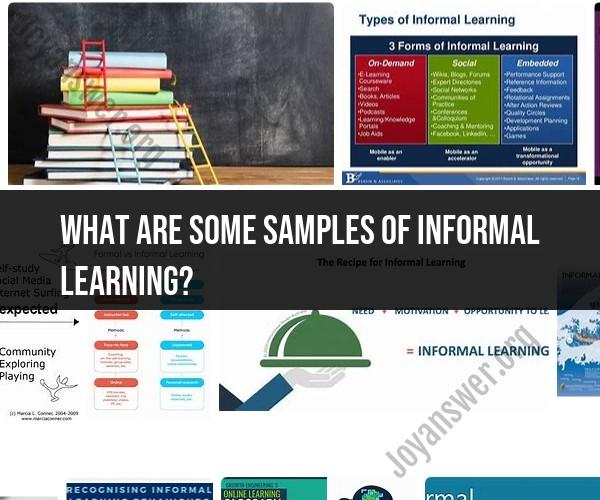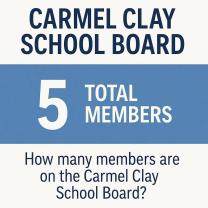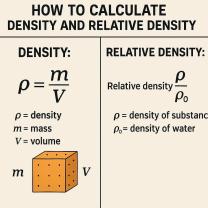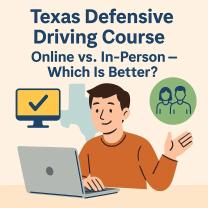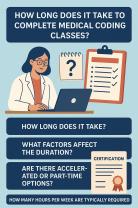What are some samples of informal learning?
Informal learning refers to the process of acquiring knowledge and skills outside of structured educational settings like classrooms or formal training programs. It is often self-directed and driven by personal interest or need. Here are some examples of informal learning:
Reading Books: Reading books on a wide range of topics can be a significant form of informal learning. Whether it's reading non-fiction books to learn about history, science, or personal development, or reading novels to improve language skills and gain insights into human behavior, reading is a valuable source of knowledge.
Online Tutorials and Videos: Platforms like YouTube, Khan Academy, and Coursera offer countless tutorials and instructional videos on diverse subjects. Individuals can access these resources to learn skills like cooking, coding, playing musical instruments, or even DIY home improvement.
Blogs and Articles: Reading blogs and articles on the internet provides information and insights on specific topics of interest. Many experts and enthusiasts share their knowledge and experiences through blogging, which can be a valuable source of informal learning.
Podcasts: Podcasts cover a wide range of topics, from science and technology to history, storytelling, and personal development. Listening to podcasts allows individuals to absorb information and stay updated on various subjects while on the go.
Conversations and Networking: Engaging in conversations with peers, colleagues, or mentors can lead to valuable informal learning. Sharing experiences and insights with others can provide new perspectives and knowledge.
Social Media: Social media platforms offer access to diverse communities of interest. Joining groups, forums, or following experts in specific fields can expose individuals to informal learning opportunities through discussions and shared content.
Observation and Mimicry: Learning by observing and imitating others is a fundamental form of informal learning. This can apply to anything from learning how to cook by watching a family member to picking up skills by watching instructional videos.
Hands-On Experience: Learning through hands-on experience is a powerful form of informal learning. This might involve experimenting, tinkering, or trying out new things, whether it's woodworking, gardening, or computer programming.
Exploration and Discovery: Exploring new places, museums, or nature reserves can lead to informal learning experiences. It allows individuals to discover history, culture, and science in an unstructured manner.
Hobbies and Creative Pursuits: Pursuing hobbies such as painting, photography, playing musical instruments, or writing can be both enjoyable and educational. Individuals often acquire new skills and knowledge as they immerse themselves in their chosen hobbies.
Traveling: Traveling to different regions and countries provides opportunities for informal learning about cultures, languages, history, and geography. It can also be a way to gain a deeper understanding of the world.
Problem Solving: Facing challenges and solving problems in daily life or work situations can lead to informal learning. It encourages critical thinking and problem-solving skills development.
Informal learning is often a continuous and lifelong process that occurs naturally as individuals pursue their interests and adapt to their changing environments. It can be a valuable complement to formal education, allowing individuals to acquire knowledge and skills that are personally meaningful and relevant.
Informal Learning in Action: Examples and Scenarios
Informal learning is any type of learning that takes place outside of a formal educational setting. It can be intentional or unintentional, and it can happen anywhere and at any time. Some examples of informal learning include:
- Having a conversation with a colleague about a new work project
- Reading an article about a topic that interests you
- Watching a documentary or tutorial on YouTube
- Experimenting with a new cooking recipe
- Playing a sport or video game
- Visiting a museum or art gallery
- Traveling to a new place and experiencing a different culture
Real-Life Instances of Informal Learning
Here are a few real-life instances of informal learning:
- A software engineer learns how to use a new programming language by watching video tutorials on YouTube.
- A teacher learns about a new educational technology by talking to other teachers at a conference.
- A student learns how to manage their time more effectively by working on a group project with other students.
- A parent learns how to cook a new dish by watching their grandmother cook it.
- A child learns how to ride a bike by practicing with their friend.
- A person learns about a new culture by traveling to a foreign country.
Showcasing Informal Learning in Various Contexts
Informal learning can be showcased in a variety of contexts, such as:
- At work: Employees can showcase their informal learning by sharing what they have learned with their colleagues, giving presentations about new topics, or writing blog posts about their experiences.
- In school: Students can showcase their informal learning by writing essays about their hobbies or interests, creating presentations about topics they have learned about outside of school, or participating in extracurricular activities.
- In the community: People can showcase their informal learning by volunteering their time to teach others about their skills or knowledge, or by writing articles or blog posts about their experiences.
Informal learning is an important part of our lives, and it can help us to grow and develop as individuals. By showcasing our informal learning, we can help others to learn and grow as well.
